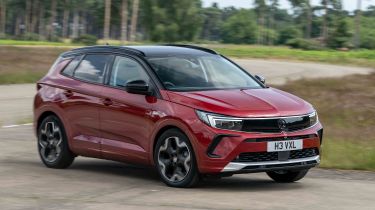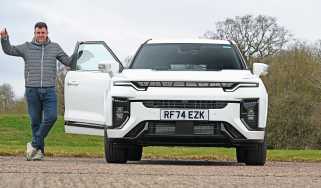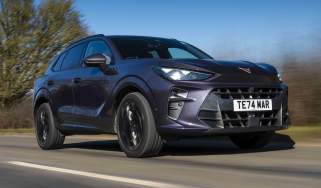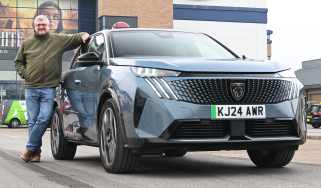Vauxhall Grandland (2017-2024) - Engines, performance and drive
The Vauxhall Grandland feels safe and secure to drive, rather than particularly fun

Just so you know, this is an older review of the 2017-2024 Vauxhall Grandland. If you are interested in information about the engines in the latest Vauxhall Grandland, or news of upcoming Vauxhall models, please follow the links provided.
We previously criticised the Vauxhall Grandland for having a fairly stiff ride, but for 2023 Vauxhall's engineers tweaked the suspension settings to increase the damping force over large bumps, and soften the response over harsher lumps.
The adjustments seem to have paid off because the suspension set-up now feels a little softer than a Ford Kuga, offering a fairly soothing ride that doesn’t crash harshly into potholes or speed bumps. However, the Grandland suffers from more suspension noise than you find in either the Kuga, or our preferred mid-size SUV, the Hyundai Tucson.
We found the steering in the Grandland to be light steering and sharp for an SUV, with a fairly tight turning circle. That should make the Grandland easy to drive around town, but out on the open road, it doesn’t have the front-end grip of the Kuga or Tucson, so the Grandland isn’t as satisfying to drive on a twisty B road. It also rolls a little bit around the turns, and heavy braking causes quite a lot of nose dive. Hit the motorway and road and wind noise is fairly well suppressed, and that soft ride continues to contribute to a relaxing feel.
Used - available now

2023 Land Rover
Defender 90
8,047 milesAutomaticDiesel3.0L
Cash £61,960
2023 Mercedes
GLA
28,116 milesAutomaticDiesel2.0L
Cash £28,760
2022 BMW
X1
33,509 milesAutomaticPetrol2.0L
Cash £23,700
2022 BMW
3 Series
48,218 milesAutomaticDiesel3.0L
Cash £28,500Ultimately, you’d be hard-pushed to call the Vauxhall Grandland fun to drive. Instead, it’s safe and predictable, so if you want a more dynamic family SUV, you’ll be better served by the Mazda CX-5 or SEAT Ateca (or its Cupra Ateca sibling).
The turbo petrol powerplant might not be the most efficient, but it still works well in town (provided you stick with the manual version), offers adequate performance for a family car, and is quiet when cruising.
Those covering big annual mileages should probably look to the fuel-saving hybrid version, which is far smoother than the automatic-equipped petrol and provides plenty of torque at low speeds thanks to its hybrid electric motor. It can even travel a short distance on EV power, which helps to improve fuel economy, although its performance boost isn’t quite as pronounced when accelerating at higher speeds, where you will have to work the engine quite hard to quickly get up to motorway speeds.
0-62mph acceleration and top speed
The 128bhp 1.2-litre three-cylinder turbo can propel the Vauxhall Grandland from 0-62mph in 10.4 seconds, and on to a top speed of 122mph. Opting for the Hybrid gains you a little more power at 134bhp, although you won’t really notice with its marginally swifter 10-second 0-62mph time and a marginally slower top speed of 121mph.












